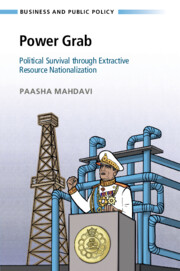Book contents
- Frontmatter
- Dedication
- Contents
- Contents
- List of Tables
- Acknowledgements
- 1 The Puzzle of Extractive Resource Nationalization
- 2 The Theory of Political Survival through Nationalization
- 3 Defining and Measuring Operational Nationalization
- 4 Why Nationalize? Evidence from National Oil Companies around the World
- 5 NOCs, Oil Revenues, and Leadership Survival
- 6 The Dynamics of Nationalization in Pahlavi Iran
- 7 Conclusion: The Implications of Nationalization
- Bibliography
- Index
7 - Conclusion: The Implications of Nationalization
Published online by Cambridge University Press: 31 March 2020
- Frontmatter
- Dedication
- Contents
- Contents
- List of Tables
- Acknowledgements
- 1 The Puzzle of Extractive Resource Nationalization
- 2 The Theory of Political Survival through Nationalization
- 3 Defining and Measuring Operational Nationalization
- 4 Why Nationalize? Evidence from National Oil Companies around the World
- 5 NOCs, Oil Revenues, and Leadership Survival
- 6 The Dynamics of Nationalization in Pahlavi Iran
- 7 Conclusion: The Implications of Nationalization
- Bibliography
- Index
Summary
This concluding chapter discusses the scholarly and policy implications of the book’s findings. Leaders that pursue predatory and opportunistic behavior are not as likely to fail as the conventional wisdom suggests; these leaders have little option to survive in power other than by seizing assets instead of building growth-enhancing institutions. This chapter then provides a policy roadmap to how extractive resources will be managed in the future for oil and for commodities that have thus far avoided nationalization. The examination of the possibility of future oil nationalizations in Lebanon and Guyana will be particularly relevant for states considering their ownership options in light of new discoveries. Rare-earth minerals and advanced materials involved in the production of renewable energy facilities and energy storage--namely cobalt, lithium, and palladium--have largely been produced by private firms. If and when the production of these materials is nationalized, it will have profound impacts not only on the leaders of producing countries, but also on the world that relies upon these resources to sustain the coming industrial revolution in clean energy.
Keywords
- Type
- Chapter
- Information
- Power GrabPolitical Survival through Extractive Resource Nationalization, pp. 212 - 225Publisher: Cambridge University PressPrint publication year: 2020

